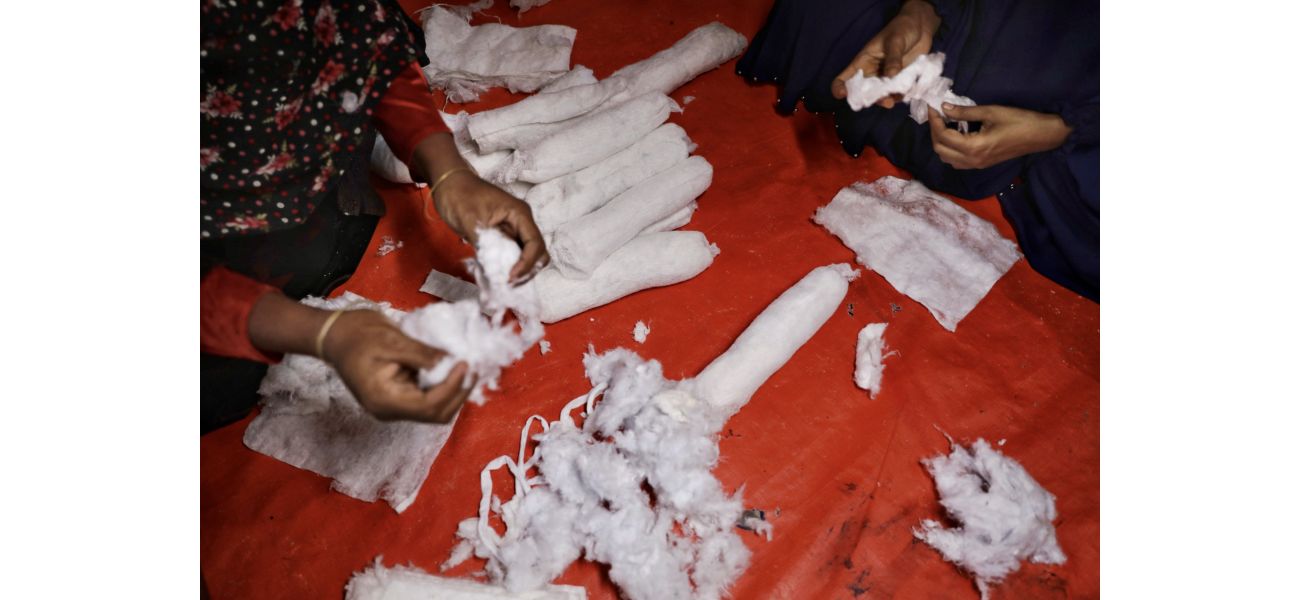Girls are purposefully stopping their periods due to concerns about hygiene.
People use medicine due to lack of clean place to wash away bleeding.
October 20th 2024.

In Shatkhira, Bangladesh, there is a low-cost sanitary napkin factory where women work tirelessly to provide a basic necessity for themselves and others. The reason behind their desperate need for this product is the lack of safe sanitation in their community. This dire situation has forced women and girls to take drastic measures, such as intentionally stopping their periods. With no clean water to wash themselves or their laundry, some have resorted to taking hormonal contraceptives without proper medical guidance or using risky pills. This issue was brought to the attention of the UK government by Samia Anwar Rafa, a youth ambassador for Water Aid. She visited London last month to present an open letter to Keir Starmer, outlining the dire situation in her home country.
In many parts of the world, access to clean water is a luxury, and climate change has only intensified this issue. Water sources are drying up, and intense heatwaves and destructive cyclones have destroyed sanitation systems. The increasing salinity due to climate change has also made water sources unusable. In such desperate circumstances, some young girls have resorted to taking contraceptive pills at a young age to stop their periods and avoid the risk of infections. However, this temporary solution can have long-term health risks.
Rafa delivered her open letter to the UK government, shedding light on the situation in her community. In Kalabogi village, located in southern Bangladesh, the main type of latrines used are hanging toilets, which are often overflowed with tidewater and severely impacted by cyclones. In her interview with Metro, Rafa explained that many women do not have access to sanitary pads and instead use rags, which they must wash and reuse. In areas where water has become more saline, these cloths are washed in salty water, causing skin irritation, infections, and severe itching.
Rafa shared, "In Bangladesh, I see my community suffering every day due to the lack of access to clean water, and climate change has only made it worse. It's taking away people's lives, their livelihoods, and putting them in a difficult position." In the southwest, where saltwater prawn farming is a major industry, the issue of women trying to stop their periods has been highlighted. In one instance, a 15-year-old girl living in this area shared her experience with a Bangladeshi newspaper. She explained how she used pieces of old rags during her periods, which she washed with dirty and salty water. Having seen her mother suffer from uterine diseases, she did not want to go through the same thing. To avoid washing with saline water, a neighbor gave her birth control pills, which she has been taking for five months.
Unfortunately, this is not an isolated case. Many women in the area resort to taking birth control pills without proper medical advice. Dr. Farhana Dewan, Secretary-General of the Obstetrical and Gynecological Society of Bangladesh, explained that skipping one period may not have any adverse effects, but repeated use can impact fertility and make it harder to resume regular periods in the future. A study conducted last year highlighted the impacts of increased salinity in coastal Bangladesh. It stated that women wash their used clothes in saline water during their menstrual cycle, and this can lead to discomfort, infections, and various health complications.
The issue of period poverty has been making headlines globally, including in the UK. In 2020, the UK government launched a scheme to provide free tampons and pads in schools after campaigns highlighted how students were skipping school due to the lack of hygiene products. In Gaza, women are taking medication to delay their periods amidst the ongoing Israeli offensive, where almost two million people are displaced and living in overcrowded conditions without access to hygiene products. Some women resort to taking norethisterone tablets, a synthetic form of the natural hormone progesterone. However, this medication can have severe side effects if taken for an extended period.
Rafa explained how rural women and girls face many challenges with water and sanitation. They are often the ones sent to fetch fresh water, putting them at risk, especially when they have to make a long trek alone. After floods or cyclones, the situation becomes even worse. Rafa stated, "Imagine being surrounded by water, but there is no clean water to drink or a toilet to use." In the most recent flooding in Bangladesh, almost 100% of the water points and toilets were not functioning in some villages. This situation is especially challenging for girls who are menstruating and do not have access to clean toilets.
In her open letter, Rafa calls on the government to prioritize clean water in their international policies and investments. She also urges countries to work together to fulfill their promises made when adopting the United Nations Sustainable Development Goals in 2015. The situation in Bangladesh is dire, and immediate action is needed to provide access to clean water and proper sanitation.
In many parts of the world, access to clean water is a luxury, and climate change has only intensified this issue. Water sources are drying up, and intense heatwaves and destructive cyclones have destroyed sanitation systems. The increasing salinity due to climate change has also made water sources unusable. In such desperate circumstances, some young girls have resorted to taking contraceptive pills at a young age to stop their periods and avoid the risk of infections. However, this temporary solution can have long-term health risks.
Rafa delivered her open letter to the UK government, shedding light on the situation in her community. In Kalabogi village, located in southern Bangladesh, the main type of latrines used are hanging toilets, which are often overflowed with tidewater and severely impacted by cyclones. In her interview with Metro, Rafa explained that many women do not have access to sanitary pads and instead use rags, which they must wash and reuse. In areas where water has become more saline, these cloths are washed in salty water, causing skin irritation, infections, and severe itching.
Rafa shared, "In Bangladesh, I see my community suffering every day due to the lack of access to clean water, and climate change has only made it worse. It's taking away people's lives, their livelihoods, and putting them in a difficult position." In the southwest, where saltwater prawn farming is a major industry, the issue of women trying to stop their periods has been highlighted. In one instance, a 15-year-old girl living in this area shared her experience with a Bangladeshi newspaper. She explained how she used pieces of old rags during her periods, which she washed with dirty and salty water. Having seen her mother suffer from uterine diseases, she did not want to go through the same thing. To avoid washing with saline water, a neighbor gave her birth control pills, which she has been taking for five months.
Unfortunately, this is not an isolated case. Many women in the area resort to taking birth control pills without proper medical advice. Dr. Farhana Dewan, Secretary-General of the Obstetrical and Gynecological Society of Bangladesh, explained that skipping one period may not have any adverse effects, but repeated use can impact fertility and make it harder to resume regular periods in the future. A study conducted last year highlighted the impacts of increased salinity in coastal Bangladesh. It stated that women wash their used clothes in saline water during their menstrual cycle, and this can lead to discomfort, infections, and various health complications.
The issue of period poverty has been making headlines globally, including in the UK. In 2020, the UK government launched a scheme to provide free tampons and pads in schools after campaigns highlighted how students were skipping school due to the lack of hygiene products. In Gaza, women are taking medication to delay their periods amidst the ongoing Israeli offensive, where almost two million people are displaced and living in overcrowded conditions without access to hygiene products. Some women resort to taking norethisterone tablets, a synthetic form of the natural hormone progesterone. However, this medication can have severe side effects if taken for an extended period.
Rafa explained how rural women and girls face many challenges with water and sanitation. They are often the ones sent to fetch fresh water, putting them at risk, especially when they have to make a long trek alone. After floods or cyclones, the situation becomes even worse. Rafa stated, "Imagine being surrounded by water, but there is no clean water to drink or a toilet to use." In the most recent flooding in Bangladesh, almost 100% of the water points and toilets were not functioning in some villages. This situation is especially challenging for girls who are menstruating and do not have access to clean toilets.
In her open letter, Rafa calls on the government to prioritize clean water in their international policies and investments. She also urges countries to work together to fulfill their promises made when adopting the United Nations Sustainable Development Goals in 2015. The situation in Bangladesh is dire, and immediate action is needed to provide access to clean water and proper sanitation.
[This article has been trending online recently and has been generated with AI. Your feed is customized.]
[Generative AI is experimental.]
0
0
Submit Comment





